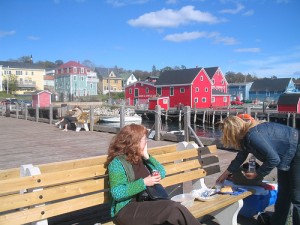Budget
Accommodation and transport will eat up most of your budget when travelling around Nova Scotia.
Single folks, staying in hostels, using buses and trains and eating most meals out can easily get through $100 a day.
Going up the scale, if you want to sleep in nicer digs, indulge in a round of golf or try out some of the many activities like whale-watching and tidal bore rafting, $200 a day would be more realistic.
The cost won’t be much higher for couples, who can share the price of rooms and rental cars so ideally find a travelling buddy, or get a group of friends together for real savings. You can also cut the budget significantly by resolving to make picnic lunches, avoid alcohol and choose simple cafes rather than higher-end restaurants.
Another way to economize is to come outside the main tourist months of July and August. Aim for the early weeks of June or the glorious start of autumn in September, when the weather should still be warm, the kids are in school and everything is generally cheaper and quieter.
If you’re really money-poor and time-rich, consider cycle touring on Nova Scotia’s quiet roads. It’s not only economical but also helps circumvent the province’s limited bus and train services.
As for typical costs, expect to pay $20-30 for a dorm bed in a hostel or a pitch at a campsite, which can be shared by a whole family. A private room in a B&B will run $60-100. Renting a car will add $40-50 a day to your expenses and a basic meal will cost at least $10, more if you add a beer or a glass of wine. Don’t forget the tip!
